Casey's
Casey’s Convenience Stores
Casey’s is a Midwest chain with more than 2,100 convenience stores that specialize in pizza and other prepared food, in addition to offering groceries, household goods, and automotive products.
1217 Caseys General Store employees have reviewed their employer on Comparably. Employees rank leadership an F and overall quality as D-.
Gas Stations
Gas stations are popular destinations, whether to refuel your vehicle or just grab a bite to eat, with many turning to them as their primary point of access. As such, this industry faces tremendous competition; to remain viable and attract customers. Therefore, competitive pricing must be offered in order for gas stations to remain relevant and draw customers in.
Independent gas stations can still compete with larger chains by offering lower costs and targeting their services more specifically towards local communities – Casey’s operates several stores in rural areas that bring fresh produce and baked goods for local residents to enjoy a more personal feel.
Location and branding can also play an integral part in the success of a gas station. A well-positioned site with good traffic flow and variety of services may attract drivers who may frequent it again and again. A specific brand name such as Shell or Chevron might appeal to drivers as a convenient way of finding it quickly and easily.
When entering a gas station into a GPS, its primary name field should always include its specific brand affiliation, to help confirm that drivers are heading toward the appropriate station for that brand. Alternatively, franchise names could be entered here such as Wilbur’s Chevron Service etc.
An important thing to keep in mind when purchasing gasoline at most stations is that while profits from gasoline sales may be higher than other general merchandise. At Casey’s, about one quarter of sales come from food items such as sandwiches and doughnuts; the rest consists of convenience goods with Casey’s making huge profits on each sale largely thanks to their strategy of drawing customers in with low gas prices before offering more profitable goods like sandwiches.
Food & Beverages
Food and beverage industries play an integral part of the economy, contributing 5% of GDP and 10% of consumers’ disposable personal income. This industry specializes in turning raw agricultural products into packaged foods, non-alcoholic beverages and alcoholic beverages – including meat processing and cheese manufacturing, making flour from grain into flour products, soft drink production as well as alcohol sales – for distribution and retail sales purposes.
Food and Beverage Services operations involve many responsibilities, including purchasing raw materials at current market prices, managing catered events, maintaining food and beverage quality continuously and making arrangements to ensure services are properly delivered. Furthermore, business results must also be analysed in order to establish future policies – with an experienced team managing these activities within the organization.
Casey’s is a full-service gas station and convenience store, providing customers with more than just gasoline. As well as offering an assortment of convenience items, each Casey’s provides delicious food options such as pizza slices and doughnuts, sandwiches, hot or cold beverages and specials so that customers can find great savings when it comes to their favorite meals or beverages.
In the late 1990s, Casey’s stores averaged approximately $800,000. By that point they had been open for 18 hours per day, seven days per week, making them an important destination for travelers and locals alike. At that time they also sold cigarettes which had historically been an important revenue generator; however these sales began declining with state smoking bans and rising wholesale tobacco costs, so Casey’s began revamping their stores accordingly.
Casey’s made their business more competitive by adopting new technologies and offering quality customer service, increasing revenue and profit margins while becoming one of the premier convenience store companies nationwide. Their model proved particularly helpful to rural communities where there was only a single merchant; Casey’s can play a crucial role in supporting community transformation efforts.
Convenience Stores
Convenience stores (c-stores) are small retail shops that stock everyday necessities, such as coffee, groceries, fruits and vegetables, snacks, confectionery, soft drinks/ice creams/soft drink mixers/toiletries etc. Additionally, most c-stores sell alcohol; usually limited to beer/wine in most jurisdictions; offer money order service and may even provide access to photocopier or fax machine for a small fee.
Some convenience stores also provide hot meals or prepared meals, including sandwiches and nachos with multiple toppings and sauces to customize their own meal. Frozen entrees that can be heated in a microwave may also be sold, along with various forms of tobacco products like cigarettes and cigars as well as refill cartridges for electronic cigarettes.
Convenience stores typically provide financial services such as automated teller machines (ATM) and wire transfers, money orders, postal stamps and prepaid phone cards for sale as well as cash back on credit card transactions and self-service check cashing kiosks; traveler’s checks may also be available though it may not be standard practice in most locations.
Convenience stores (c-stores) may primarily be seen as places to purchase essential goods, but they can also serve as social hubs for customers. As such, they compete with supermarkets and restaurants for customers’ discretionary spend; their ability to meet all sorts of consumer needs makes convenience stores an essential player in local economies.
As they look to gain market share from restaurants and grocers, c-store chains have taken to using loyalty programs to draw customers in. One such loyalty program in Canada offered by Couche-Tard includes fuel discounts as well as promotional offerings.
7-Eleven is the most well-known convenience store chain in the US with over 7,100 locations nationwide, operating both franchised and corporate-owned stores. Other US chains include FamilyMart, Circle K and Lawson – though in certain cities and areas one chain may predominate over others.
Restaurants
Casey’s is a chain of convenience stores offering restaurants serving pizza, sandwiches and doughnuts as well as beverages and grocery items to their customers. Travelers, residents of local communities and workers who need a quick bite on the go all visit Casey’s.
K.C. Lamberti gave Casey’s its name when he imagined its new convenience stores as having a hometown atmosphere where local residents could gather for coffee and chat about current affairs. To give his logo an authentic barn/general store feel, he chose red and yellow colors with the silhouette of a rooster weather vane on top.
Casey’s operates over 2,300 locations today and serves primarily the Midwest with over 200 in Illinois alone. People seeking food or fuel on interstate highways will find Casey’s at nearly every exit – its loyalty program rewards members based on total spend or purchasing frequency with points and free products!
Casey’s is known for their fast service and delicious meals. Their menu offers hot sandwiches, cold and fresh salads, wraps and burgers; there are even low-cal options such as an Italian sub or breaded pork sandwich with taco pizza!
Casey’s offers delivery and takeout services for their customers, making food delivery even simpler via their mobile app or website. In addition, many locations provide dine-in options.
Drivers appreciate having convenience stores that double as restaurants and grocery stores to fill their gas tank or provide some refreshments on the road. Anyone seeking to open their own restaurant should consider following Casey’s franchise model of success by researching their market, choosing an ideal location and using professional advisors to set up a successful venture in America’s heartland.
Step-by-step training on how to sell to retail chains!
We explain exactly how to do that and how to get started today. I’ve taught over 100,000 of companies over the years across the globe on how to get your products to the stores. And so we’re here to support you. Or please subscribe to our Youtube channel and or be on the lookout for additional training that we create.
We are here to expedite the process of generating revenue with your physical products and that’s what we’re all about. Take a look at our advanced training, live events, certification programs and so much more.
In this training, I will discuss some of the things to think about when approaching a retailer to sell your products and become a vendor. Hope it helps! 🙂
Karen Waksman,
Retail MBA
Questions? Contact Us!
1-855-Retail-2 (Call or Text)
Email: info@retailmba.com
Retail MBA provides a step-by-step formula on How to Sell to Major Retailers, Online Retailers, Smaller Retailers, Catalogs and More. No Experience Required! These solutions continue to convert for clients year-over-year! These are Time-Tested and Proven Strategies that we utilize ourselves when going after stores! Everything we teach, we test. Want access to these formulas? ANY one of our programs and coaching systems gives you access to them now. With that said…
Here are 5 Easy Ways to Work with Us:
1) Free Training – If You Would Like to Join Our Next FREE Webinar Training Called “Retail Chain Store Secrets – How to Sell to Major Retail Chains. No Experience Required” Then Sign Up NOW To Learn All About Selling into Retail Chains By Clicking Here!
2) Retail MBA Year Long Coaching and Training System – Our Year Long Coaching and Training System with Karen Waksman is POWERFUL! This is our most popular training and coaching system! We walk you through how to approach, pitch and sell to retail chains and we coach you along the way! Join us by Clicking Here!
3) Masterclass Intensives – Want to Join our Next 4 Week Elite Retail MBA Masterclass Intensive? These Intensives Are EPIC for people who Love Fast Paced Learning – Homework, Retail Coaching, Developing Your Strategy, Buyers Contacts and More! These Events Are Held Every Quarter. Join us by Clicking Here!
4) Done-for-You Program – If You Want Karen Waksman and Her Team to Reach Out to Your Top Dream Retail Chains On Your Behalf – And You Have a Retail-Ready Product, Check Out our Epic Done-For-You Service by Clicking Here!
5) In Person Events – If You Want to Learn LIVE and Meet Karen Waksman in Person at Our Next “America’s Next Retail Product: LIVE Event with Other Like-Minded Individuals in Beautiful San Diego, CA! We Would LOVE to Have You Join Us by Clicking Here!
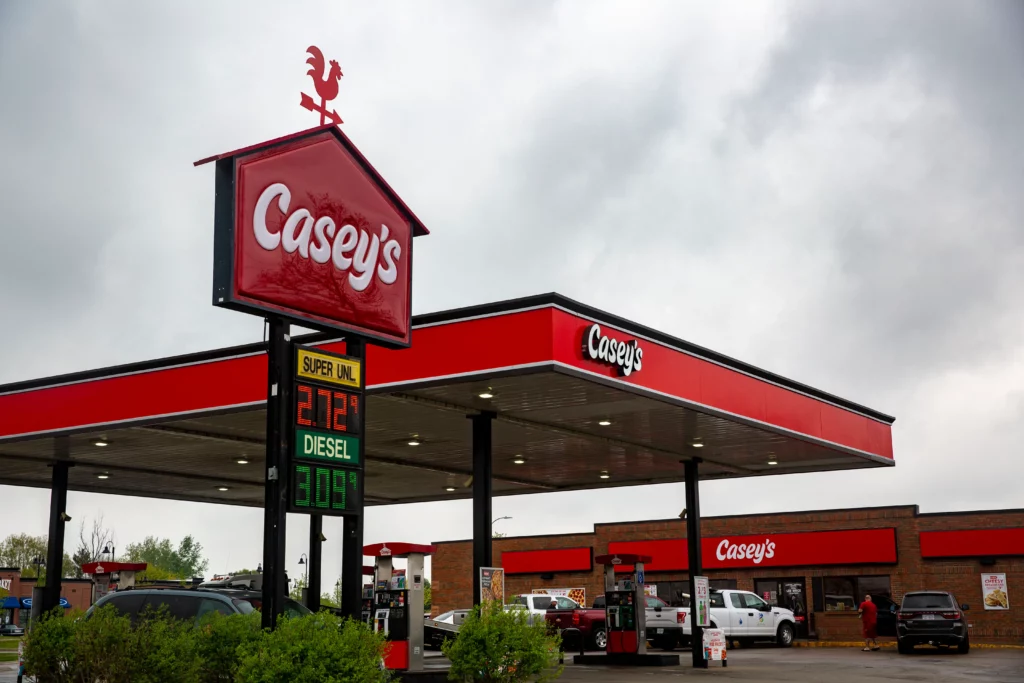
Check Out Our Additional Blog Posts Here:
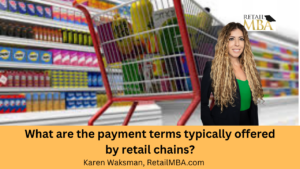
Retail Terms
Retail Terms – What are the payment terms typically offered by retail chains? Click Here to Learn More!
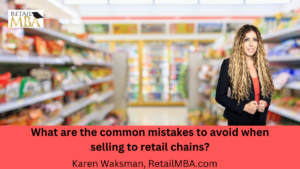
Retail Vendor
Retail Vendor – What are the common mistakes to avoid when selling to retail chains? Click Here to Learn More!

How to Sell Your Holiday Products to Retail Chains
New Training on How to Sell Your Holiday Products to Retail Chains

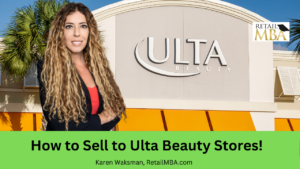
Ulta Beauty Vendor
Ulta Beauty Vendor – How to Sell to Ulta Beauty Stores. Click Here to Learn More!
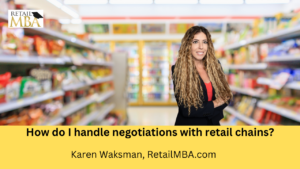
Retail Strategy
Retail Strategy – How do I handle negotiations with retail chains? Click Here to Learn More!


